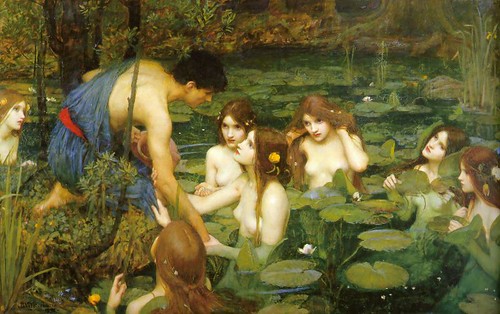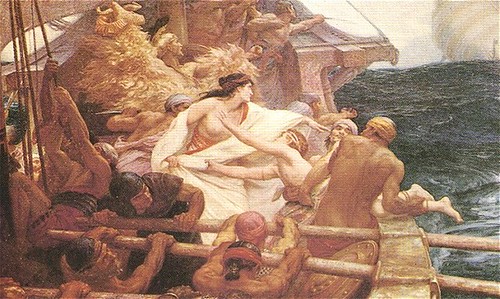Perhaps this is best illustrated in the composition of the Argonauts. As Wood notes, just about every hero of Greek legend turns up in the crew of the Argo; Orpheus, Atalanta, Theseus in some accounts, and of course, Heracles (Hercules). It's a fair bet that this wasn't the original form of the legend. Robert Graves, in The Greek Myths, suggests that this is down to every city-state in Greece having to have its own representative amongst the crew, and that's no doubt part of it. But another factor is surely the natural tendency of storytellers to have the characters from one story meet characters from another. Just think of all those stories in which Sherlock Holmes hunts Jack the Ripper, or (to cite a recent Hugo-winning short story) gets involved in the Cthulhu mythos, or the teaming up of previously unconnected superheroes that started in the 1940s with the Justice Society of America. Kim Newman has made a career of writing such stories. So, what I'm saying is that the Argonauts were transformed into a sort of ancient Greek League of Extraordinary Gentlemen. Some of them are really only in there for the sake of it - Atalanta does nothing much in the story bar be the only female crew member.
In a programme broadcast last summer (Greek Gods and Goddesses: Jason and the Argonauts), to coincide with the Athens Olympics, the Jason myth was examined by a number of scholars. A key part of the tack taken by the programme was to read the story as a rite-of-passage allegory. In this reading, Heracles is the older man who becomes mentor the younger Jason, but who cannot be there at the final test, which Jason must face alone. Now there's probably something in this - that the story has a rite-of-passage theme from the very start seems plausible, and I can believe that later storytellers did choose to use the relationship between Heracles and Jason in that way. However, this needs to be set against the probability that Heracles does not belong in the original legend. The main reason Heracles has to be removed quickly is that otherwise Heracles, the strongest hero in Greek myth, will take over the whole tale, which is meant to be Jason's story - indeed, there are some versions of the legend in which this is exactly what happens. Hence the Hylas story, to take Heracles offstage.
(For those who aren't familiar with it, Hylas, Heracles' young companion - and eromenos, 'beloved', to Heracles' erastes, 'lover' - is taken by nymphs; there's a magnificent Waterhouse painting of the event shown below. While Heracles is searching for the boy, the Argo departs on a favourable wind. In the 1963 film, Heracles decides to leave the crew of his own volition. The Greeks legends are less cosy - Heracles is abandoned, knowingly or unknowingly, sometimes under divine instruction that he is not fated to complete the quest.)

John William Waterhouse (1849-1917), 'Hylas and the Nymphs' (1896).
There is also cross-pollination with the Odyssey. So, Jason's voyage also features an encounter with the Sirens, this time defeated by Orpheus outsinging them, rather than everyone stopping up their ears. It's notable that this incident belongs to the return part of the voyage, which suggests to me that this too is a late addition. Dramatically, Jason's story climaxes with the taking of the Fleece and the escape from Colchis. At that point, the story needs to move as quickly as possible to the resolution of Jason's being deprived of his rightful throne in Iolcos by his wicked uncle Pelias. (The 1963 movie doesn't even bother with that, and ends after Jason has the Fleece, leaving unresolved the Pelias plotline with which it begins.) Thus the return journey should be completed without serious incident. But it looks as if later, less talented, storytellers felt that, logically, the journey home should have as many incidents as that out. Still, the return does give us the episode with the bronze giant Talos, an episode which, sensibly moved to the journey to Colchis, forms one of the most memorable sequences of the 1963 film.
Wood rightly noted the dark conclusion of Jason's tale - the murder of Pelias, the flight to Corinth, and Medea's slaying of their children. For some reason, however, he leaves out Medea's first crime - the dismemberment of her own brother Apsyrtus to delay her pursuing father Aeetes, who stops to pick the pieces out of the sea.

Herbert Draper (1863-1920), 'The Golden Fleece' (1904).
In general, this series continues to be slightly below par Wood, and he doesn't seem as enthusiastic as he has before. Perhaps it's that the choice of subjects is not his own - they certainly seem a fairly predictable selection. Or maybe having to fit everything worth saying on each into sixty minutes is too much of a strain.
(Click on the photos for sources and more information.)
2 comments:
Glad you posted that. I watched the old film with the kids around Christmas time (with special added interest because of studying Medea last year), and I wondered why Heracles didn't carry on -- though obviously, as you say, the rest of the trip would have been too easy if he had. I must listen to Daniel's Tales of the Greek Myths tape again, and see what version that has.
Martin.
Excellent treatment of the Jason myth, which I'm presently researching along with other 'initiation' myths in the Greek canon. Loved the Draper painting, and also treasure some good statues of Jason -- I always try to combine sculpture with painting in my account of myths!
Best,
J. L. Speranza
The Swimming Pool Library
Villa Speranza, Bordighera
and
St. Michael & St. George Hall
Calle 58, No. 611
La Plata B1900BPY
Buenos Aires, The Argentine
Post a Comment